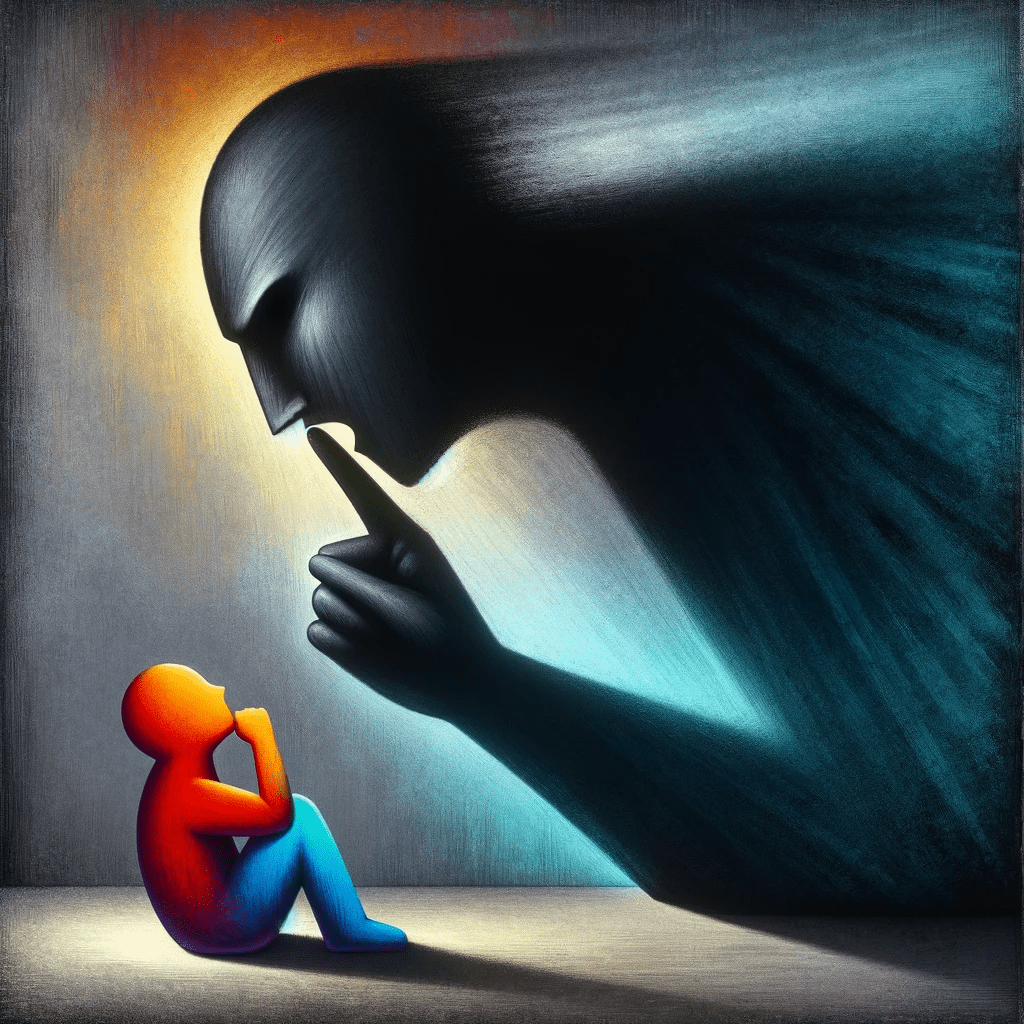One of my favourite quotes from the soon-to-be-released Family Rules, a peer-reviewed article. Prof. Mark Johnson and I delve into how a dysfunctional paternal system can generate long-lasting pain and other chronic disorders. The quote talks about what happens when the child sees or hears something that the parent wishes they hadn’t. It then captures fear’s role in shutting down free speech. This explains why individuals “put up with” and live a life of oppression and serfdom. You might be surprised at the effect nonconscious Family Rules can have on your personal and professional life.
“As the child grows older, the experience may be assigned to a myth or kept a secret, following a Family Rule of maintaining silence out of fear of reprisal. It is as if the secret “hangs” in the relationship as an “ever-present noose,” ready to tighten if it should ever be approached.”
The extract from “Family Rules” suggests that fear can play a significant role in suppressing one’s voice, particularly in a family dynamic. The concept of a secret being likened to an “ever-present noose” in a relationship illustrates how fear can create a pervasive and stifling atmosphere. This fear often stems from potential consequences or reprisals if the secret is revealed or discussed.
Here’s a breakdown of how fear can shut down the voice, using this extract as a reference:
Fear of Reprisal
The phrase “fear of reprisal” implies that there are perceived or real consequences for breaking the silence. These consequences could range from emotional backlash, like anger or disappointment from family members to more severe outcomes. The anticipation of such reactions instils a deep fear that discourages open communication. This is prevalent across the world at the moment as governments fear the population will discover the truth about the past few years. One might argue that this is why truth itself is being stifled as the wrongdoers fear the reprisal of the masses awakening.
Internalisation of Fear
As the child grows older, they may internalise this fear. The secret or the experience becomes deeply embedded in their psyche, influencing their behaviour and communication patterns, even outside the family setting. The long-term physical and mental health impact of life under these uncaring oppressors takes its toll. This is why there are so many chronic physical and mental health conditions.
Mythologising or Secret-Keeping
The process of assigning experiences to myths or keeping them secret is a mechanism for coping with fear. By mythologising, the individual distances themselves from the reality of the experience, a process known as dissociation. Keeping it a secret helps in avoiding the perceived danger of disclosure. This explains why people would sooner create a thousand lies than tell one truth.
Creation of a Culture of Silence
The Family Rule of maintaining silence is a directive born out of fear. In families and organisations, these unspoken rules can be powerful, dictating behaviour without the need for explicit instructions. The fear of breaking these rules leads to self-censorship. This is why so many people are unable to speak out and challenge wrongdoings. Some organisations have “whistleblower policies”, which are designed to prevent an individual from speaking out about wrong doings. Imagine the harms some organisations are carrying out on a daily basis because of this.

The Metaphor of the Noose
The use of the noose metaphor is particularly poignant. A noose represents a threat of suffocation or strangulation; similarly, the secret and the fear it engenders can suffocate open communication and expression. The idea that it “hangs” in the relationship indicates a constant presence. This looming threat constrains and confines the individual’s ability to speak freely. Your gut tells you there is something wrong but no one dares to speak.
Psychological Impact
This constant state of fear and self-censorship can have a profound psychological impact. It may lead to anxiety, a sense of helplessness, and a lack of authenticity in personal expression. This is because the individual is always guarding against the risk of revealing the secret. You will sense that there is something going on, but again no one will open up.
Playing the Game
The Scottish Psychiatrist R.D. Laing wrote:
They are playing a game.
They are playing at not playing a game.
If I show them I see they are, I shall break the rules and they will punish me.
I must play their game, of not seeing I see the game.
The “poem” is taken from Knots (Laing, 1972) and it highlights the many ways humans can be entangled in mental knots. Whether in the home or the workplace, Family Rules can have a pervasive hold on your thoughts, beliefs, behaviour and your overall wellbeing.
Conclusion
In summary, fear, particularly in the form of paternalistic-imposed rules of silence, acts as a powerful force that suppresses the voice. It creates a threatening environment where the risk of speaking out feels too great, leading to a culture of silence and internalised self-censorship. The link for the article: Hidden Family Rules: Perspective on a Dysfunctional Paternalistic System and the Persistence of Pain and the book Family Rules Okay: becoming Whole Without The Need For Approval is available on Amazon. If you are feeling bold then why not come and join us at the live 3-day-workshop in January 2024
References
Laing RD. Knots: selected works of RD Laing: vol 7. New York: Random House Inc (1972).
Hudson M. Family rules okay: becoming whole without the need for approval. (2023).
